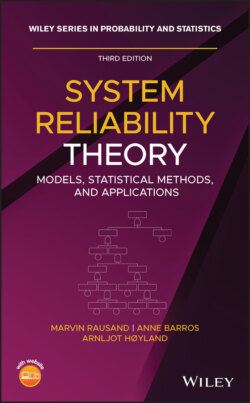Читать книгу System Reliability Theory - Marvin Rausand - Страница 21
1.3.1 Reliability
ОглавлениеDefinition 1.1 says that reliability expresses “the ability of an item to perform as required in a stated operating context and for a stated period of time.” We start by clarifying the main words in this definition.
1 Reliability is defined by using the word ability, which is not directly measurable. A quantitative evaluation of the item's ability to perform must therefore be based on one or more metrics, called reliability metrics. Several probabilistic reliability metrics are defined and discussed in Section 1.4.
2 Some authors use the word capability instead of ability in the definition of reliability and claim that the term “capability” is more embracing, covering both ability and capacity. Most dictionaries list ability and capability as synonyms. We prefer the word “ability” because this is the word most commonly used.
3 The statement perform as required means that the item must be able to perform one or more specified functions according to the performance criteria for these function(s). Functions and performance criteria are discussed in Section 2.5.
4 Many items can perform a high number of functions. To assess the reliability (e.g. of a car), we must specify the required function(s) that are considered.
5 To be reliable, the item must do more than meet an initial factory performance or quality specification – it must operate satisfactorily for a specified period of time in the actual operating context.
6 The stated period of time may be a delimited time period, such as a mission time, the time of ownership, and several more.
7 The time may be measured by many different time concepts, such as calendar time, time in operation, number of work cycles, and so on. For vehicles, the time is often measured as the number of kilometers driven. For items that are not operated continuously in the same mode, a more complicated time concept may be needed.
